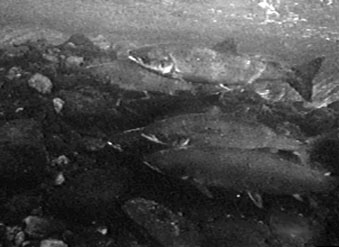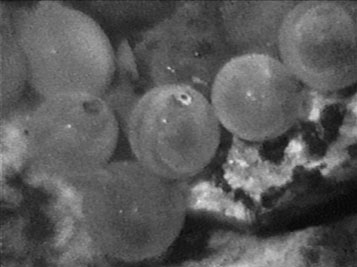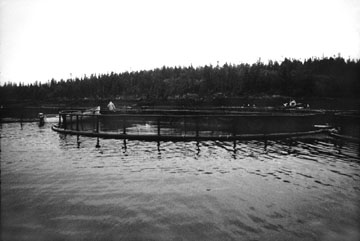|
Since the last issue of The Maine Woods, there has been a burst of activity on the wild salmon front, starting with the October admission by the US Fish and Wildlife Service and National Marine Fisheries Service that the Atlantic Salmon is, indeed, on the brink of extinction, followed by the feds' November announcement that they would, once again, seek protection for the salmon as an endangered species. Then in December anti-conservation forces kicked off a concerted offensive, starting with Maine Governor Angus King's failed attempt to use Maine Public Television as a bully pulpit against protecting the salmon, followed in January by similar anti-conservation pronouncements by a coterie of the state's congressional and local politicians, who have vowed to use their offices to protect the right of foreign and absentee corporations to continue despoiling eastern Maine's rivers and bays, wild salmon be damned.  As we go to press, anti-environmental propagandists hired by the multinationals are putting their efforts into whipping up an anti-environmental frenzy among the people of eastern Maine. The October Revolution. Two years ago, the US Fish and Wildlife Service and the National Marine Fisheries Service had stunned conservationists by abruptly withdrawing their proposal to protect the Atlantic Salmon in Maine under the guidelines of the Endangered Species Act. While the official line was that the all-volunteer Atlantic Salmon Conservation Plan developed by the Maine government was "adequate" to bring back the nearly vanished salmon, documents recently obtained under the Freedom of Information Act show that then-Senator William Cohen (R-Maine) threatened to pull funding from the Interior Department budget unless the agencies pulled the listing proposal. Cohen's evidently illegal act is now under investigation; the threat nonetheless was effective and the proposed listing of the Atlantic Salmon as "threatened" under the Federal Endangered Species Act was withdrawn. In October 1999, however, the two federal agencies began a revolution in thinking. In a joint biological 'status report' the U.S. Fish and Wildlife Service and the National Marine Fisheries Service announced that the number of wild Atlantic Salmon had continued to fall and that the wild salmon "are in danger of extinction despite considerable efforts to ensure their survival." Then in November, the feds took the next logical step, and re-proposed protection under the Federal Endangered Species Act. Because of the continuing profound decline in wild salmon, the agencies called for protecting the fish as "endangered" rather than as "threatened". In a joint statement, Jamie Rappaport Clark, Director of the Fish and Wildlife Service, and Penny Dalton, Director of the National Marine Fisheries Service told reporters: "Although significant efforts have been made to recover the species under the State of Maine's conservation plan, existing measures to protect wild salmon are no longer enough to ensure their survival." "While Maine's existing conservation plan is vital to recovering the species, it doesn't adequately address the increasing threats salmon are facing from aquaculture, fish disease, habitat modification and catch-and-release fishing," "It's time," the agencies said, "to consider tougher protective measures to ensure survival of the species."  December 1999. While the two federal agencies had stressed that they would "continue to work closely with the State of Maine, industry and the conservation community to protect wild salmon," the reaction from the Maine government and the pulp & paper and agribusiness companies was just the opposite. Maine Governor Angus King set the stage with an abortive December 2, 1999 attempt to foist a multimedia propaganda spectacular on Maine public television. The show, entitled 'Restoration, Not Regulation', so blatantly pandered to industry that none of the electronic media would run it, including, to King's mortification, his alma mater, Maine Public Television. The governor posted "Restoration Not Regulation" on his internet site, but the multi-megabyte size of the file was so large that few went to the trouble to download it off the web. The much shorter text version was also available; wags quickly dubbed King's essay "Restoration Not", for its efforts to simultaneously shift blame for Maine's salmon collapse to interests outside the state, while absolving the in-state culprits with a cloud of public relations ink. January 2000. While the governor's rambling essay was inconsequential, and did little besides muddy the issues with half truths and even outright lies (his wholly false claim that fish pen operators would have to move their pens into federal waters offshore being one of the most egregious), it signaled the start of a veritable corporate blitzkrieg against protecting the salmon. One of the more remarkable events to date was a January 5th event organized by the "Sunrise County Economic Council" a non-profit lobbying group run by Machias resident Diane Tilton. Billed as a chance to discuss the issues surrounding protection of the salmon, it quickly became evident that discussion was the last thing intended. Tilton, in fact, had rejected a request by federal officials to speak at the event, on the grounds that the event would be a discussion, "not talking heads". Oddly enough, Tilton then proceeded to do the 'talking heads' thing. Instead of a discussion, the roughly 200 people that showed up suffered through a pair of rambling half hour long attacks against protecting eastern Maine's wild salmon by lobbyist Tilton herself and by State Planning office head Evan Richert. Couched in Orwellian New Speak, Tilton and Richert warned of vague "potential economic downfalls", and complained that the federal government was somehow wrong to step in to protect the wild salmon before the state's initial five year plan was fully run through. This despite overwhelming evidence that the state's voluntary plan was being ignored by the multinational logging, agribusiness and aquaculture interests infesting eastern Maine, and that the salmon's precipitous decline had worsened since the state began its voluntary plan. Tilton was particularly vexed by the prospect that conservation and commercial fishing groups would use the Endangered Species Act to force enforcement of state and federal laws prohibiting water pollution, stream diversion, soil erosion and the spread of disease to wild fish and shellfish. "The Act provides tools ," Tilton said " to others who would do intentional harm to our economy in the name of salmon."  It would be unfair, she said, to require the multinationals to obey the law. In fact, "Nowhere," Tilton said, "do the Services come out and say what those industries will have to do," as though those industries were so used to ignoring environmental and public health laws that they were now incapable of finding out what those laws are, let alone following them. Tilton and Richert also advanced the spurious and well discredited claim that there was "no support that our salmon are genetically distinct from elsewhere," ignoring years of research by state, federal and academic scientists to the contrary. But keeping the salmon unprotected was "only part of this huge complicated issue." Tilton intoned darkly. Statements made by state planning office head Evan Richert and Maine's political delegation, after Tilton finished, illuminated some of the "other parts". Evan Richert State Planning office. Richert's statement was, if possible, even more misleading than Tilton. Weirdly describing the federal endangered species listing process as "both inappropriate and illegal." Richert then attacked the research carried out by state, federal and academic scientists as "disappointingly poor science", predicted that the Endangered Species Act will be ineffective, and repeated Tilton's "breach-of-agreement" and "non-uniqueness" claims. Richert then made the astonishing assertion that although the population of wild salmon in Maine had plummeted to less than 30 fish in 1999, these numbers, "though disturbingly small, are not low enough to merit listing." This leads one to wonder just what number Richert would consider low enough. Richert, like Tilton, complained that forcing the multinationals to obey the law in Maine was "taking a hammer to one small part of the problem, with nothing as to the rest," and repeated the old refrains that the state was "close" to having voluntary plans to protect the salmon, "close" to being an aquaculture code, "close" to having fish health rules, "close" to setting out weirs to capture aquaculture pen escapees, and "close" to water withdrawal management plans. Translation: three years into the state's salmon restoration plan, the fish have dwindled to nearly zero, and the state has yet to fulfill a single one of its objectives. Richert was followed by a brief statement by Maine Commissioner of Marine Resources Georges LaPointe, who was clearly uncomfortable with the tenor of the meeting.Then came somewhat incoherent effusions by representatives of Maine's political establishment: Gail Kelley from Olympia Snowe's Bangor office said that the Senator had the "unequivocal belief that an ESA listing would have dire consequences." Comically, the political staffer went on to say that "This decision deserves to be made on the basis of sound science, not politics.". Senator Collins' Bangor office staffer "It is critical that citizens become informed on this ill-advised process that threatens to wreak havoc on the economy of Downeast Maine." Representative John Baldacci's Presque Isle staffer repeated the discredited "hardly any significant differences" line and asserted that federal protection of the salmon "threatens support for restoration efforts." State Representative Shorey from Calais revealed that a joint resolution is circulating among the state legislators opposing the protection of wild salmon. "There will be small pockets of resistance to this", Shorey said ominously, " but we will overcome them." There was no pretense of discussion at the meeting. Just the reverse proved true. After the political talking heads had exhausted themselves, the several hundred people there began actually discussing the pros and cons of protecting the fish. Protection supporters Jeff Reardon of Trout Unlimited, Andrew Goode of the Atlantic Salmon Federation, Laura Rose Day of the Maine Rivers group, Torrey Scheafe of the Wild Salmon Resource Center, Robert Phipps, a naturalist from Bar Harbor, and an unidentified fly fisherman from Ellsworth began to discuss the positives of salmon protection with the rest the meeting attendees. But this dialog was cut off when Tilton, clearly uninterested in having opposing points of view heard, abruptly ended the meeting.
The decision by US Fish and Wildlife Service and the National Marine Fisheries Service on whether to protect Maine's wild salmon under the US Endangered Species Act will be made after members of the two agencies review all the testimony they received at the public hearings and all the letters, reports and other information that they receive by March 15th. By either having spoken at one of the three public hearings or by writing a letter (no emails accepted) to either of the two agencies at the addresses below, you can ensure that the salmon and eastern Maine's rivers receive the protection they need to once again come alive with salmon and all of their ecological co-habitants. Here's how to do it: The public comment period on the plan to protect the salmon has been extended to March 15, 2000. You are STRONGLY encouraged to write a letter in support of protecting the Atlantic Salmon under the Endangered Species act to EITHER of the following two addresses (note that EMAIL letters will NOT be accepted): Endangered Species Program Coordinator Chief, Division of Endangered Species Tell them that the Atlantic salmon is threatened by disease, the use of foreign strains of Atlantic Salmon in the U.S. aquaculture industry, by fishpen aquaculture escapees competing for food and shelter, by water withdrawal from salmon streams by industrial berry plantations and by siltation of streams and rivers due to sloppy forest practices. Tell them that the state will not or cannot protect our wild salmon and their homes in Maine's bays, rivers and streams from these problems, and that, just as the Endangered Species Act protects wild salmon in the Pacific Northwest while allowing forestry, farming and aquaculture to continue to thrive, so it can protect and bring back Maine's wild salmon. Be as brief or as lengthy as you like. Send along news clippings reports or anything that you think will help make your point to them, as well. It is as simple as that. For technical information about how Maine's
wild Atlantic Salmon are doing, On the web: the status review can also be
downloaded from the following
Other Articles About Atlantic Salmon in This Issue Atlantic Salmon, Extinction by Politics? Atlantic Salmon Hearings Testimony at Salmon Hearings Will We Ever Learn: Report of the Commission to study the Atlantic Salmon (1947) A Fish Tale of Two States |